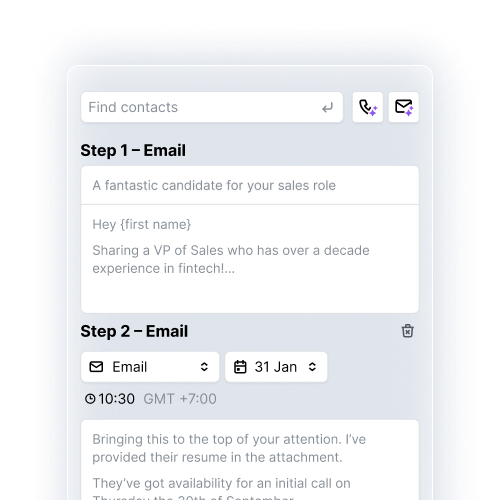
// Recruitment Technology, Executive Search Best Practices, Recruitment Strategies
Talk the Talk! 10 Interview Questions and Strategies for Executive Assessments
21/10/2024
9 MIN
When recruiting for senior executive positions, it is essential to go beyond just understanding their qualifications. You need to assess their ability to support those claims with concrete examples. This is why asking the right decision making interview questions and using recruitment technology is essential for evaluating their strategic thinking, judgement, and leadership abilities.
Let’s explore ten powerful interview questions and strategies that will help you evaluate their ability to make sound decisions under pressure, their approach to risk, and how they navigate complex scenarios.
10 Decision Making Interview Questions for Executive Roles
Ensuring your team is equipped with the right questions can make all the difference. Here are ten effective decision making interview questions designed to help your recruitment team excel in filling leadership positions, enabling them to make informed assessments.
- Can you describe a time when you made a difficult decision with incomplete information?
This question is designed to understand how the candidate deals with ambiguity. In executive roles, decisions are often made without having all the facts, and it’s critical to gauge how comfortable they are with uncertainty.
Look for signs of adaptability, confidence in their judgement, and effective risk management.
- How do you ensure your decisions align with the company’s long-term goals?
Executives must think strategically, balancing immediate needs with the broader vision of the organisation. This question helps assess their strategic thinking, long-term vision, and alignment with company objectives.
Look for strategic thinking qualities, long-term vision, and company alignment.
- Tell me about a time when you had to change a major decision. How did you handle it?
Even executives make wrong calls from time to time. The ability to recognise and rectify a mistake is key to strong leadership. This question reveals how the person deals with setbacks and corrections.
Look for characteristics such as humility, accountability, and resilience in the face of setbacks.
- What is your approach to involving stakeholders in the decision-making process?
Executives often work with diverse teams and departments, so it’s important to understand how they bring people into the fold when making decisions. This question probes their leadership style and how effectively they engage diverse teams when making decisions.
Look for evidence of collaborative decision-making, strong leadership, and communication skills.
- Share an experience where you had to make a decision that was not well received by others. What steps did you take to manage the negative reactions?
Navigating difficult decisions can be challenging, especially when they’re not well received. This question offers insight into their leadership under pressure, ability to stand by tough calls, and skill in managing dissent.
Look for traits such as confidence, communication under pressure, and conflict resolution.
- What process do you follow to assess the risks and benefits before arriving at a decision?
Executive roles often demand a careful balance between risk and reward. This question aims to uncover their approach to analysing future scenarios and mitigating risks to achieve the desired outcome while driving results.
Look for strong analytical skills, effective risk assessment, and a sound decision making methodology.
- Can you give an example of a decision you made that had a significant financial impact on your organisation?
Financial acumen is critical for executives, and this question helps assess their experience in making decisions with major financial implications. Understanding their thought process in high-stakes scenarios is key for executive positions.
Look for financial acumen, strategic impact, and accountability.
- When faced with multiple equally good options, how do you choose the best course of action?
Not all decisions are about avoiding risks. Sometimes, executives need to select the best from several good options. This question reveals their prioritisation skills and decision-making framework.
Look for critical thinking, prioritisation, and clarity in judgement.
- What’s your process for making decisions when your team is divided on the best course of action?
Executives often need to mediate between differing opinions, and this question helps determine their conflict-resolution skills and leadership ability to unite teams around a decision.
Look for their approach to conflict management, team leadership, and unifying decision making.
- How do you manage the stress that comes with making critical decisions?
Executive roles come with immense pressure, and the ability to handle stress while making clear, effective decisions is vital. This question uncovers how well they perform under stress, scrutiny, and urgency.
Look for high emotional intelligence qualities and strong stress management skills.
By using these questions in your interview process, you can evaluate not only the technical aspects of an executive’s decision-making ability but also their leadership traits, risk management strategies, and strategic thinking.
When you’re interviewing an executive candidate, every detail matters.
But it’s all too easy for important points to get lost in your notes. That’s why using an AI note taker lets you focus on the conversation and quickly find the key details when you need them.
Pick the ideal AI note taker tailored to your business needs – or better yet, try our smart interview note taking feature, seamlessly integrated into our recruitment platform.
Now, let’s explore some actionable strategies to help you and your team take the right approach when asking these decision-making interview questions to evaluate executives.
10 Key Strategies for Executive Recruitment Success
A thoughtful approach to evaluating candidates for leadership positions involves several key strategies from standardising the interview process to adopting recruitment technology.
Here are ten actionable strategies to assist you and your team in effectively navigating the interview and assessment process for executive roles:
1. Develop a Comprehensive Executive Profile
Create a detailed profile for each executive role that outlines the essential skills, experiences, and traits needed for success. Include factors like industry knowledge, leadership style, and cultural fit to guide your team in identifying suitable candidates.
Action Steps:
- Collaborate with your clients to create a thorough job description for each executive role.
- Identify not just the technical skills required but also soft skills, leadership styles, and cultural fit.
- Define key responsibilities and how success will be measured within the role.
How does a comprehensive executive profile help you find the right fit?”
A detailed profile helps your team focus their search and ensures that they’re evaluating executives against clear criteria. This approach minimises mismatches and improves overall placement success.
2. Standardise the Interview Process
Implement a structured interview framework that incorporates decision making interview questions. This approach promotes consistency in evaluating, enabling your team to fairly assess skills and competencies across the board. While flexibility is important, a structured method ensures uniformity in how your team evaluates executive candidates.
Action Steps:
- Develop a structured interview framework.
- Standardise the use of decision-making interview questions (like those mentioned earlier) and set up a framework for assessing key executive traits such as strategic vision, risk management, and team leadership.
- Train your team to use this framework uniformly for all candidates applying for the same role.
- Include a scoring system to quantify responses, making it easier to compare executives objectively.
Why standardising the interview process makes life easier for everyone involved?
Using a standardised process helps keep evaluations consistent and ensures that key competencies are assessed fairly across all candidates. This structured approach makes it easier to compare candidates and guarantees that every important skill is evaluated consistently.
3. Incorporate Behavioural and Situational Questions
Encourage your team to use behavioural and situational interview questions alongside decision making questions (like those mentioned earlier). This helps gauge how executives have handled past challenges and how they might approach future scenarios.
Action Steps:
- Provide training for your team on crafting and asking behavioural and situational questions that reveal candidates’ past performance and future potential.
- You could ask questions like, “Can you share an experience where you had to make a tough decision while under pressure?” or “How would you approach a significant change in strategy?”
How do behavioural and situational questions uncover the real potential of executive candidates?
These techniques help assess how they have navigated challenges in the past and how they would handle similar situations in the future, providing deeper insights into the person’s decision making skills.
4. Leverage Executive Assessment Tools
Consider using executive assessment tools to evaluate decision-making abilities, leadership styles, and emotional intelligence. These tools can provide valuable insights that go beyond traditional interview questions.
Action Steps:
- Research and select reputable executive assessment tools that measure decision-making abilities, leadership styles, and emotional intelligence.
- Integrate these assessments into your recruitment process and ensure your team is trained on interpreting the results effectively.
How executive assessment tools can transform your recruitment strategy?
Assessment tools provide objective data to supplement interview insights, allowing your team to identify those who may excel in leadership roles, ensuring a more data-driven approach to hiring.
5. Encourage Team Collaboration
Promote collaboration among your recruitment team when assessing candidates for executive roles. Encourage group discussions and collective evaluations to benefit from diverse perspectives and shared insights.
Action Steps:
- Establish regular team meetings to discuss evaluations collaboratively.
- Use a shared platform to record and review assessments, facilitating open dialogue about each candidate’s strengths and weaknesses.
How does encouraging team collaboration lead to better hiring decisions?
Collaboration encourages diverse perspectives, leading to more well-rounded evaluations and preventing unconscious biases from influencing the decision-making process.
6. Encourage Thought Leadership and Engage in Active Networking
Building strong networks within executive circles is essential for your team. Encourage them to attend industry events, participate in webinars, join professional groups, and engage with thought leaders in the sectors they recruit for.
Action Steps:
- Support your team in building and maintaining professional relationships within relevant industries through networking events, industry conferences, and online platforms like LinkedIn.
- Set up a ‘networking fund’ to encourage team members to attend relevant events.
Why is thought leadership and active networking essential for your recruitment success?
A well-connected team can access a larger pool of qualified executives and gain insights into market trends that may inform their recruitment strategies. Networking also opens doors for your team to find passive candidates who may not actively be seeking new roles and insights that they can use to better assess them.
7. Provide Client Education and Insight
Ensure your clients understand the executive hiring process and the importance of cultural fit. Provide them with guidance on what to look for in candidates, helping to set realistic expectations and improve collaboration.
Action Steps:
- Conduct workshops or informational sessions for clients about the nuances of executive hiring, including timelines, candidate expectations, and the importance of cultural fit.
- Provide them with resources or guides on what to look for during the hiring process.
How can providing client education and insight improve your relationships?
Informed clients are more likely to engage constructively in the recruitment process, resulting in a a positive outcome that includes improved collaborations and greater satisfaction.
8. Create a Feedback Loop Between Clients and Your Team
When hiring for executive positions, close collaboration with clients is essential. Ensure your team spends quality time with clients to understand not just the job description but the company culture, leadership needs, and strategic vision. Encourage consultants to go beyond standard questionnaires to truly grasp the expectations and challenges that the new executive will face.
Action Steps:
- Following each placement, gather feedback from both clients and candidates regarding their experiences with the recruitment process.
- Create a system for analysing this feedback and identifying patterns.
- Use this information to refine your team’s approach to executive hiring, ensuring continuous improvement.
What’s the value of creating a feedback loop between clients and your team?
A robust feedback loop helps refine your team’s skills over time, fostering continuous improvement and enhancing client satisfaction. Deeper client insight allows for more targeted candidate searches, resulting in a better match for both skillset and cultural fit.
9. Stay Updated on Industry Trends
Encourage your team to stay informed about trends and developments in the industries they recruit for. Understanding market shifts, challenges, and opportunities allows your team to make more informed decisions and spot potential talent.
Action Steps:
- Encourage your team to subscribe to industry publications, attend webinars, and participate in relevant online forums to stay current on market trends and shifts.
- Organise regular internal briefings where team members can share insights and knowledge gained from their research.
Why staying updated on industry trends is essential for your recruitment agency?
Staying informed about industry trends equips your team to identify potential candidates and understand the challenges clients face, leading to more tailored and effective recruitment strategies.
10 . Adopt and Implement Recruitment Technologies
Adopting and implementing recruitment technology can significantly improve your ability to identify top-tier executive candidates. With AI-driven platforms and automation tools, you can streamline the hiring process, enhance candidate sourcing, and ensure a more personalised approach to outreach.
Action Steps:
- Adopt AI recruitment platforms to analyse extensive pools of executive profiles, focusing on decision-making, performance metrics, and leadership styles.
- Use AI-powered intelligent candidate sourcing tools to automate the initial stages of recruitment, freeing up time to build meaningful relationships with candidates rather than spending hours on manual searches.
Employ AI tools to craft tailored outreach messages that feel customised for each recipient.
This approach helps establish rapport from the beginning and increases the likelihood of a positive response.
Simplify your workflow with built-in, multi-step outreach cadences for candidates and clients, all offered in a modern recruitment platform like Atlas.

- Streamline workflows and eliminate repetitive tasks through automation, helping to remove bottlenecks and speed up the time-to-hire. Tasks that once took hours, such as scheduling interviews or sending follow-up emails, can now be completed in a fraction of the time.
- Make sure your recruitment team is well-versed in operating these technologies. Provide training sessions or resources to help them understand the capabilities of the tools and how to integrate them into their daily workflows to maximise their benefits.
How do recruitment technologies elevate your executive search efforts?
By integrating recruitment technology, you can make data-backed decisions that speed up the executive search process and improve the quality of shortlisted profiles. Here are some key advantages:
- Automated workflows streamline repetitive tasks, reducing the time spent on administrative duties and speeding up the entire recruitment cycle.
- With technology handling routine tasks, your team can concentrate on strategic activities, such as relationship-building and candidate engagement.
- Advanced candidate sourcing tools can quickly identify qualified candidates from vast talent pools, enabling your team to focus on those who are the best matches for the roles.
- Tailored communication fosters stronger connections with candidates, leading to higher engagement rates and an improved candidate experience.
- A seamless and personalised recruitment process enhances candidates’ perceptions of your agency, making them more likely to engage positively.
- Personalised approaches lead to more meaningful interactions, increasing the likelihood that top candidates will respond and remain interested throughout the recruitment process.
This holistic approach ultimately results in a more efficient executive search strategy, allowing your team to focus on high impact activities that drive real business outcomes. As a result, you’ll be well-equipped
Want to reclaim 2 hours each day?
Start by making your candidate sourcing simpler and create strong connections from the start!
Our platform uses sophisticated algorithms to explore extensive talent pools, ensuring you receive only the most pertinent profiles.
Forget those pricey add-ons for your applications! With our built-in outreach options, you can enjoy a smoother workflow with both candidates and clients.
Discover the benefits now!
Score Big in Executive Recruitment with a Strategy-First Approach
Finding the right executive can feel challenging, especially when assessing their decision making skills. By using the ten decision making interview questions and strategies we’ve discussed, you’ll have a concrete approach to match your clients with their perfect candidate.
By focusing on critical thinking, strategic judgement, and their ability to handle complex challenges, you can find candidates who have the right skills and fit well with your clients’ company culture.
And let’s not overlook the advantages that recruitment technology brings. The right recruitment platform can take the stress out of your assessment process and make your decision making process much more efficient. As you refine your interview techniques, remember that these strategies not only help you find the right executive, they also help you secure more business.
Additionally, by adopting new technology, you can showcase your agency as a forward thinking powerhouse, leaving a lasting impression on your clients. So, if you’re ready to make your mark and demonstrate what you can do, Atlas is the smart choice for your business. Give it a try!








